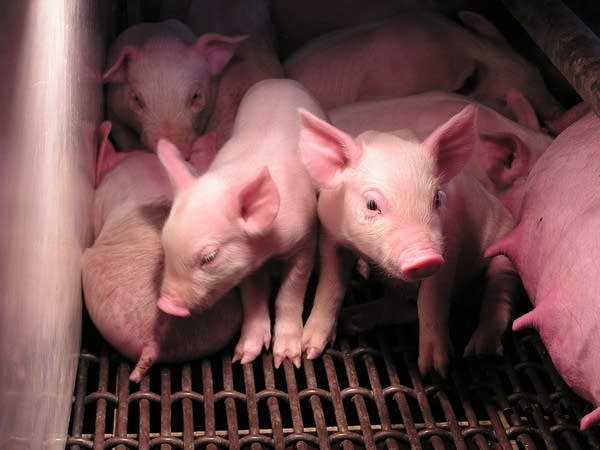PED virus threatens piglets, farm finances
Go Deeper.
Create an account or log in to save stories.
Like this?
Thanks for liking this story! We have added it to a list of your favorite stories.

Minnesota hog farmers have a new disease to worry about, a virulent form of diarrhea that is deadly to young pigs.
The disease is known as porcine epidemic diarrhea virus, or PED, and until this spring it had been confined to Europe and Asia for decades.
Scientists aren't sure how it got to the United States, but it has spread quickly to more than 200 hog herds nationwide, including 19 in Minnesota.
Unlike some recent influenza viruses, it can't be transmitted to people, either through the air or in meat from an infected animal.
Turn Up Your Support
MPR News helps you turn down the noise and build shared understanding. Turn up your support for this public resource and keep trusted journalism accessible to all.
Albert Lea veterinarian Amber Stricker first encountered the disease in May when she walked into a customer's hog barn in northern Iowa.
"What I saw there was very, very loose watery diarrhea and it was affecting the majority of pens," Stricker said. "There was approximately 10 to 12 percent of the pigs that were showing signs of gauntness, and maybe some depression and lethargy."
Laboratory tests confirmed the hogs were infected with PED, but Stricker said the farm was fortunate because fewer than a half dozen pigs died. That's because the pigs were past four weeks. For pigs under three weeks, PED means almost certain death, she said.
"It is devastating," said Stricker. "And there's no question about that. Mortality rates have been reported as high as 100 percent."
That kind of loss makes the disease a major economic threat to Minnesota's $2.5 billion hog industry. And it has arrived at a time when pig producers are still recovering from sharp losses over the past year caused by high corn prices.
Hog farmers are paying attention, said Randy Spronk, president of the nation's largest hog organization, the National Pork Producers Council. On his farm, Spronk said, he is extra vigilant that any trailers transporting hogs are free of the PED virus.
"We want to be making very sure that those trailers are washed, disinfected and dried so that that disease is not brought back from a market place to my farm," Spronk said.
Hog farm workers are being told to wash and change clothes when entering or leaving a hog barn, he said.
Very few medical treatments are available for the virus. One tool is to intentionally introduce the virus into the mother pigs, said University of Minnesota hog disease scientist Montserrat Torremorell.
"That way they get infected, they develop immunity and that immunity is passed to the piglets," Torremorell said.
Torremorell said farmers should closely monitor their herds because early detection gives them a better chance of limiting damage.
So far, university staff have tested more than 800 hogs nationwide for the PED virus. More than 180 were positive. Torremorell said the number of new cases appears to be leveling off, but it's still too early to know if the rapid spread of the disease is over.



